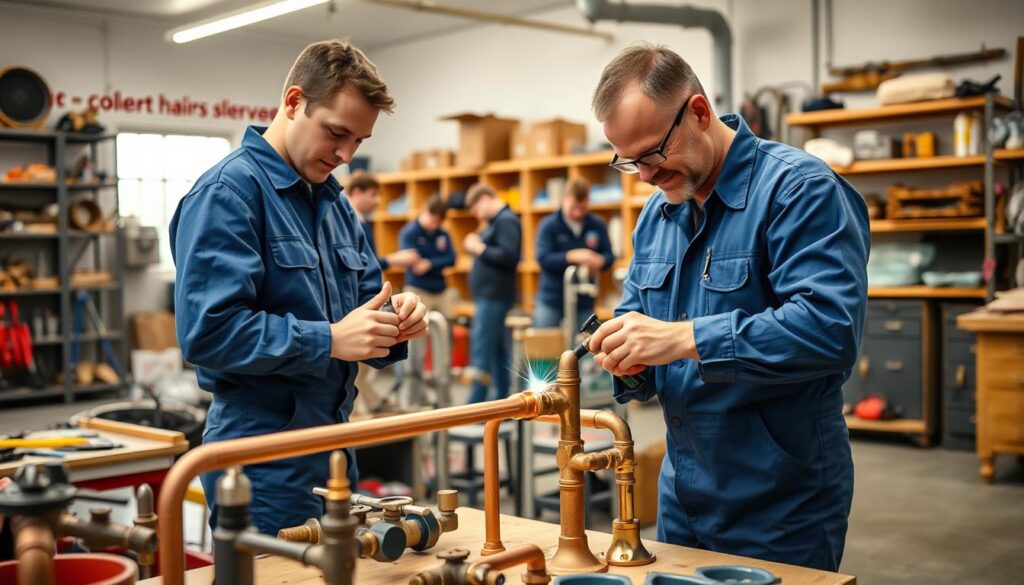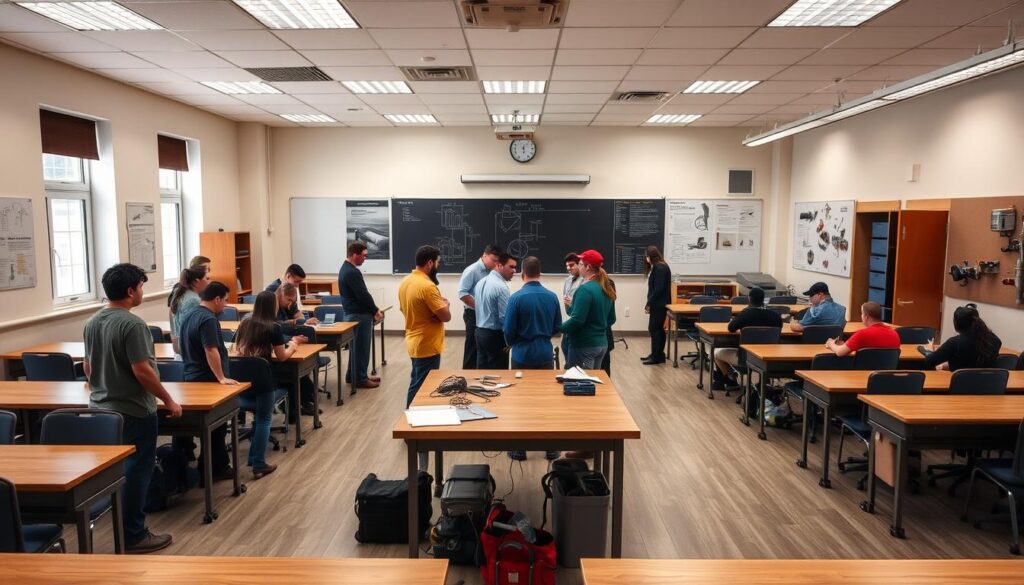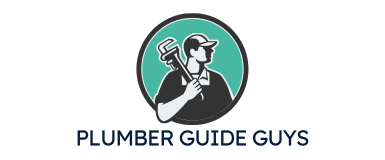Affiliate Disclosure
Plumber Guide Guys is a participant in the Amazon Services LLC Associates Program, an affiliate advertising program designed to provide a means for sites to earn advertising fees by advertising and linking to Amazon.
Did you know the U.S. needs about 25,000 new plumbers every year? This is because of the growing need for infrastructure. Knowing what education is needed to become a plumber is key for those interested in this career.

Plumbing is a skilled trade with stable jobs and good pay. If you want to join plumbing apprenticeship programs, you’ll need to spend time in detailed training. This training mixes classroom learning with real-world experience.
To become a professional plumber, you need a well-planned education. Your path will include high school prep, specialized technical training, and more. Each step is important for learning new skills.
Key Takeaways
- Plumbing careers offer excellent job stability
- Comprehensive education is essential for success
- Apprenticeship programs are critical for skill development
- Technical training combines classroom and practical learning
- High demand exists for skilled plumbing professionals
Table of Contents
Basic Educational Requirements for Aspiring Plumbers
Starting a plumbing career means knowing the basic education needed. You’ll first need a solid foundation from school. This prepares you for the plumbing job’s technical and physical challenges.
A high school diploma is the first step for plumbers. Most employers and training programs need this as a starting point.
Critical High School Preparation
High school is a great time to learn skills for plumbing. Focus on subjects that help with plumbing training:
- Mathematics: Algebra and geometry are key for accurate measurements
- Physics: It helps understand mechanical and fluid dynamics
- Technical drawing: You’ll learn to read blueprints and visualize spaces
- Shop classes: These classes improve your hands-on skills
Physical Requirements and Skills
Being a plumber requires more than just book smarts. You need certain physical skills and traits:
- Strong manual dexterity
- Physical stamina for tough work environments
- Problem-solving skills
- Ability to work in tight or hard-to-reach places
Pro tip: Many high schools now offer vocational training programs that can give you a head start in your plumbing career.
What Education is Needed to Become a Plumber
To become a professional plumber, you need a mix of classroom learning and hands-on training. Your journey to getting certified starts with knowing the key educational steps. These steps will shape your plumbing career.
There are several educational paths to becoming a plumber. You’ll need to look into different options that cover all the plumbing certification requirements:
- Vocational school programs
- Community college technical courses
- Apprenticeship training
- Technical certification programs
Most plumbers start by focusing on specific educational paths. These paths teach essential skills. To become a plumber, you typically need:
- A high school diploma or equivalent
- Technical training in plumbing systems
- Practical skills development
- Understanding of safety protocols
“Successful plumbers combine theoretical knowledge with practical expertise,” says Robert Martinez, a veteran plumbing instructor.
Your education will cover many plumbing areas, like homes, businesses, and factories. Technical programs give you deep training. This prepares you for different work settings and complex plumbing issues.
Choosing the right educational program is key to your success. Look for accredited schools that teach modern plumbing methods. They should also cover blueprint reading, math, and current industry standards.
Invest in your future by choosing an educational path that provides both theoretical knowledge and practical skills.
Understanding Plumbing Apprenticeship Programs
Plumbing apprenticeship programs are a great way to start your career. They mix classroom learning with real-world experience. This helps you become a skilled plumber.
Starting a plumbing apprenticeship means you’re in for a 4-5 year journey. You’ll learn both the theory and practical skills needed in the trade.
Length of Apprenticeship Training
These programs are designed to last 4-5 years. You’ll get around 8,000-9,000 hours of training. This includes both classroom and on-the-job learning.
Classroom Instruction Hours
In your journeyman plumber education, you’ll spend a lot of time in class. You’ll learn important technical skills:
| Instruction Area | Typical Hours |
|---|---|
| Mathematics and Calculations | 120-180 hours |
| Safety Protocols | 80-120 hours |
| Technical Drawing | 100-140 hours |
| Plumbing Systems | 200-240 hours |
On-the-Job Training Components
Practical experience is key in plumbing apprenticeships. You’ll work with experienced plumbers. This helps you learn in real-world settings:
- Residential plumbing installations
- Commercial building maintenance
- Industrial system repairs
- Advanced diagnostic techniques
“An apprenticeship is not just a job, it’s a career-launching opportunity that provides invaluable hands-on experience.” – Skilled Trades Professional
After finishing a plumbing apprenticeship, you’ll be ready to become a certified journeyman plumber. You’ll have a solid base in both technical skills and practical knowledge.
Pre-Apprenticeship Training Programs
If you dream of becoming a skilled plumber, pre-apprenticeship training is key. These programs offer a strong start before a full apprenticeship. They help you shine in the plumbing trade.
Pre-apprenticeship training brings many benefits for starting your plumbing career:
- Develop essential technical skills
- Learn fundamental safety protocols
- Gain practical knowledge about tool usage
- Increase employability in vocational training for plumbers
Vocational schools and community colleges have great pre-apprenticeship programs. They prepare you for apprenticeships by covering plumbing theory, safety, and technical skills.
Pre-apprenticeship training includes:
- Introductory plumbing courses
- Safety training and certification
- Basic tool handling and maintenance
- Blueprint reading fundamentals
- Mathematics for technical trades
Employers love candidates with pre-apprenticeship training. It shows you’re serious and have a solid base. This training shortens your learning time and speeds up your plumbing career.
Technical Training and Classroom Education
Starting a career in plumbing means learning through technical training and classroom education. A trade school for plumbing offers detailed learning experiences. These prepare you for the plumbing world’s challenges. You’ll learn specialized courses that boost your technical skills.

Classroom lessons for plumbers cover many key subjects. These lessons build a strong foundation in the trade. You’ll learn important topics that turn theory into practical skills.
Core Subject Areas
- Plumbing fundamentals and theory
- Building and plumbing codes
- Piping frameworks and installation techniques
- Drafting and technical drawing skills
- Applied science principles
Safety Protocols and Regulations
Safety is key in plumbing education. Your training will focus on important safety rules. These rules protect workers and clients.
- Personal protective equipment (PPE)
- Workplace hazard identification
- Electrical safety procedures
- Proper handling of tools and materials
Blueprint Reading and Mathematics
Being good at blueprint reading and math is essential for plumbers. Precision and analytical thinking are your most valuable tools. You’ll learn to:
- Interpreting architectural drawings
- Calculating pipe measurements
- Understanding spatial relationships
- Applying geometric principles
Investing in technical training is key to excelling in plumbing. It lays a strong foundation for your future career.
Trade School and Vocational Training Options
Choosing the right trade school for plumbing can start your career in the skilled trades. Vocational training for plumbers offers a clear path to becoming a professional. These programs give you the education needed for plumbing’s practical challenges.
Trade schools have specialized programs for plumbing skills. You’ll find different paths for various career goals:
- Certificate programs (6-12 months)
- Associate degree programs (2 years)
- Comprehensive plumbing technology courses
When picking a vocational training program for plumbers, consider these factors:
| Program Feature | What to Expect |
|---|---|
| Curriculum Depth | Comprehensive technical training in pipe systems, tools, and installation techniques |
| Hands-on Training | Practical workshops and simulated work environments |
| Industry Connections | Potential internship opportunities and networking |
Your trade school for plumbing should offer more than classroom learning. Look for programs with real-world experience and direct apprenticeship paths. Many vocational training for plumbers have partnerships with local contractors and unions. This gives you a competitive edge in the job market.
Investing in quality vocational training is your first step toward a stable and rewarding career in plumbing.
Certification and Licensing Requirements
Understanding plumber licensing can be tricky, as rules change from state to state. Knowing these rules is key to doing well in plumbing.
Plumbing certification rules vary by place. It’s important to check your state’s rules. Some states need strict licenses, while others are more relaxed.
State-Specific Licensing Landscape
Every state has its own rules for plumbers. To get licensed, you usually need to:
- Finish an approved apprenticeship program
- Get verified work experience
- Pass a detailed licensing test
- Meet basic education needs
Examination Process
The test checks your skills and knowledge. Most states want you to show you know:
- Plumbing codes and rules
- Safety steps
- How to install things
- How to fix and keep things running
Your test might have written and hands-on parts. To get ready, study local plumbing codes, technical guides, and take practice tests.
“Proper certification is your passport to a successful plumbing career.” – Professional Plumbers Association
To keep your certification, you need to keep learning and renew your license often. Keep up with new industry rules and local changes to keep your skills current.
Journey to Becoming a Master Plumber

Going from a journeyman plumber to a master plumber is a big step in your plumbing career. Your journeyman plumber education is the base for reaching this high level of skill.
To become a master plumber, you must meet tough qualifications. These show your advanced skills and knowledge. The path includes:
- Completing a minimum of 4-5 years as a licensed journeyman plumber
- Getting a lot of on-the-job experience
- Passing a detailed master plumber exam
- Getting state-specific certifications
The Red Seal endorsement is a top certification for skilled tradespeople. It lets qualified plumbers earn more and work in different places.
Master plumbers have big career benefits, like:
- Higher earning power
- Starting their own plumbing businesses
- Leading big construction projects
- Getting more respect in the trade
Staying committed to learning and growing is key to becoming a master plumber. Take advanced courses, keep up with new technologies, and get special certifications. This will help you stand out in a competitive field.
Continuing Education and Professional Development
Staying up-to-date in plumbing is key. As new tech and rules come out, plumbers need to keep learning. This helps them stay ahead and offer top-notch service.
Growing in your career means learning new things. Professional development keeps you on top of the game. It ensures you meet today’s standards and client needs.
Industry Updates and New Technologies
Plumbers today must know about new tech and methods. Focus areas include:
- Green plumbing technologies
- Water conservation systems
- Smart home plumbing integration
- Advanced pipe and fixture materials
Advanced Certifications
To boost your master plumber status, get more certified. Look into special certifications that show your skills and dedication:
- Advanced water treatment systems
- Sustainable plumbing practices
- Commercial plumbing specializations
- Energy-efficient system design
Investing in your education boosts your skills and value. It can also raise your earnings.
Career Advancement Opportunities
Being a plumber is more than just fixing pipes. The plumbing world has many paths for growth. This is true for those who want to become master plumbers.
To move up in your plumbing career, you need to improve your skills. You also need to get the right plumbing certifications. There are many exciting paths you can take:
- Residential Plumbing Specialist
- Commercial Plumbing Technician
- Industrial Plumbing Professional
- Independent Plumbing Contractor
- Plumbing Business Owner
Choosing a specialty can really boost your career. By focusing on areas like green plumbing or industrial systems, you become an expert. This makes you more valuable in your field.
Here are some ways to advance:
- Pursue advanced certifications
- Go to specialized training workshops
- Network with other professionals
- Keep up with new technologies
With hard work and learning, you can go from a beginner to a leader. You could lead in construction, maintenance, or even start your own business.
Conclusion
Becoming a professional plumber takes dedication and careful planning. You’ll go through many stages of learning and skill building. From high school to plumbing apprenticeships, your journey requires hard work and growth.
The plumbing field offers many chances for those who invest in their education. Success comes from learning in class and gaining practical experience. You must also keep up with new technologies and safety rules. Plumbing apprenticeships are key to a lasting and fulfilling career.
As you grow in your career, remember that learning is ongoing. Every certification, training, and experience you gain makes you better. The plumbing world values skilled, adaptable, and safety-focused professionals.
Your plumbing career begins with smart educational choices and embracing all training options. By following a clear path and staying passionate, you can achieve a rewarding and impactful career in this vital field.

